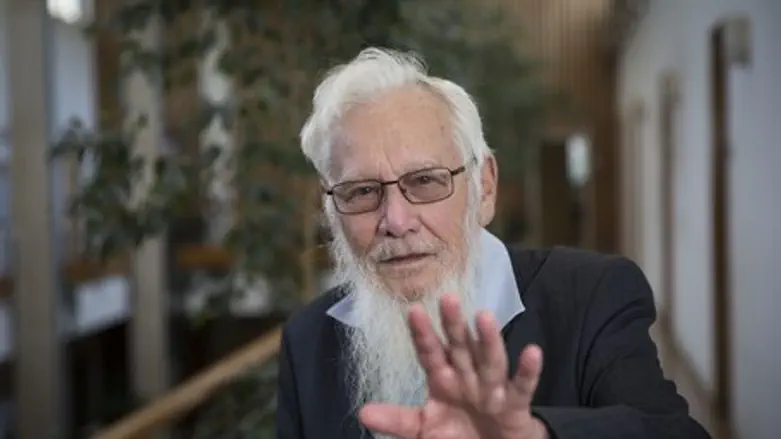
Nobel Prize in Economics winner Prof. Yisrael (Robert) Aumann spoke to Arutz Sheva ahead of the elections next Tuesday, and despite concern that Likud may be outpaced by Labor in the race to form a government, he had sharp words for Prime Minister Binyamin Netanyahu.
Aumann said he doesn't hold it against leftist sources for their campaign against Netanyahu over the 2011 Gilad Shalit deal that saw 1,027 terrorists go free.
"I was against the Shalit deal, it was a great mistake and if people on the left say it, that doesn't bother me," said the professor. "It's important that a man running in elections, that they look at his record."
Speaking about the leftists making the accusations, he noted "it could be they're hypocrites, but the fact that they're reminding someone of his actions in election days is like one needs to be reminded during the High Holy days (between Rosh Hashanah and Yom Kippur) of his deeds during the year."
"The elections are the High Holy days of politicians and it's good that they remind him of the Shalit deal, that was something that should not have been done. Maybe if they remind him he won't do it again," reasoned the professor.
Aumann notes that the outgoing government also was weak in terms of allowing destruction in Judea and Samaria, noting "also on the topic of Mitzpe Kramim, even in election days he (Netanyahu) isn't taking action, also on this we expect him to do something to save the community and he isn't."
The professor is aware of the danger that Labor chairman Yitzhak Herzog may outpace Netanyahu and form a leftist government, saying "there's a danger that the majority will go to Herzog, but even if leftists remind him (Netanyahu) of his past mistakes - if they don't remind who will?"
False polls
Turning his attention to the topic of the waves of polls leading up to the elections, Aumann argued a law should be passed requiring supervision over the polling in Israel.
"The polls aren't reliable, and maybe they should have been under supervision, because people can say whatever they want," he said. "Every election they don't succeed (in predicting the results) and then talk for two days about why they didn't succeed, find excuses, and in the next elections everyone forgets and again go to polls."
Aumann also spoke about radical Arab MK Hanin Zoabi's running in the elections after the High Court overruled a decision barring her, and opined that she should be allowed in.
"I think that was a mistake to distance her (from the Knesset due to her open support of Hamas - ed.) for a certain period. Democracy is based on people being able to say what they want, and certainly so for an MK elected by their public," he said.
Zoabi raised outrage after making numerous public statements supporting the Hamas terrorist organization, which in its very charter calls for the genocide of all Jews, and just last summer launched its third terror war to try and destroy Israel.
"It's important that the public knows what the people they elect and represent think," said Aumann. "Everyone should have free speech that isn't unlimited, but an MK needs to have nearly unlimited free speech."
He added, "to the same degree I of course think that the barring of Meir Kahane was undemocratic," a reference to former MK Rabbi Meir Kahane who called to expel hostile Arab residents and was barred in the late 1980s in a bill that outlawed "racist" parties - without even defining what constitutes racism.
